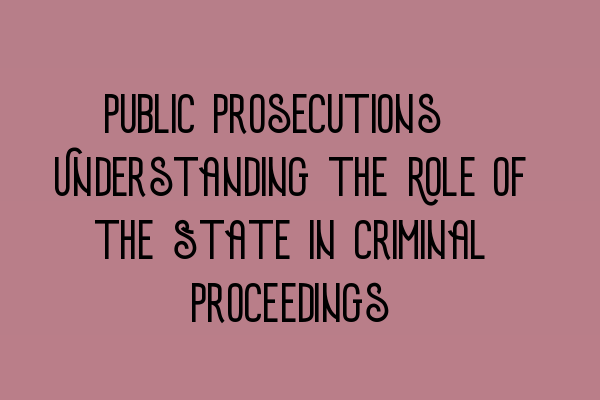Public Prosecutions: Understanding the Role of the State in Criminal Proceedings
Welcome to the SQE Criminal Law & Practice Law UK blog. In this article, we will delve into the important topic of public prosecutions and shed light on the role of the state in criminal proceedings. Understanding this role is crucial for aspiring solicitors and those preparing for the SQE exams.
The Role of the State in Criminal Proceedings
In the criminal justice system, the state plays a significant role in investigating and prosecuting crimes. The state, represented by the Crown Prosecution Service (CPS) in England and Wales, has the responsibility of bringing the accused to justice on behalf of the public interest. Public prosecutions aim to maintain law and order, protect society, and ensure that individuals who commit crimes are held accountable for their actions.
When a crime is reported to the police, they investigate the matter and gather evidence. If the police believe that there is enough evidence to proceed with the case, they will submit the investigation file to the CPS. The CPS then evaluates the evidence and makes a decision on whether to prosecute the accused.
It is important to note that the CPS acts independently and makes its decisions based on two key tests: the evidential test and the public interest test. The evidential test focuses on whether there is sufficient evidence to provide a realistic prospect of conviction. The public interest test considers various factors, including the seriousness of the offense, the impact on the victim, and the wider community.
If the CPS decides to proceed with a prosecution, they will present the case in court on behalf of the state. During the trial, the prosecution will present evidence and arguments to prove the guilt of the accused beyond a reasonable doubt. The defense, on the other hand, represents the interests of the accused and challenges the prosecution’s case.
It is important to recognize that a fair trial requires the prosecution to disclose all relevant evidence to the defense, ensuring a level playing field. This principle is fundamental to the criminal justice system and promotes transparency and fairness.
In some cases, the defendant may opt for a plea bargain, where they agree to plead guilty to a lesser charge in exchange for a reduced sentence. The decision to accept a plea bargain lies with the prosecution, who evaluates the strength of the evidence and the public interest in securing a conviction.
Preparing for the SQE Exams
If you are preparing for the SQE 1 or SQE 2 exams, it is crucial to have a solid understanding of public prosecutions and the role of the state in criminal proceedings. This topic is likely to be tested in the Criminal Law and Practice sections of the exams.
To enhance your preparation, we recommend exploring our related articles:
- SQE 1 Practice Exam Questions
- SQE 1 Practice Mocks FLK1 FLK2
- SQE 2 Preparation Courses
- SQE 1 Preparation Courses
- SRA SQE Exam Dates
These articles provide valuable resources and information to help you excel in your SQE exam preparation. By familiarizing yourself with different practice questions, mocks, and preparation courses, you can enhance your knowledge and understanding of criminal law and practice.
At SQE Criminal Law & Practice Law UK, we are committed to supporting aspiring solicitors on their journey to success. Stay tuned for more informative articles and resources to help you excel in your legal career.
Feel free to reach out to us if you have any questions or require further guidance. Good luck with your SQE exam preparation!
